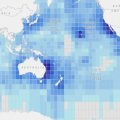You can do it reef-walking, snorkelling or scuba diving. You can do it with the elderly or with kids. It’s a great way to spend your holidays, and you can help save the world’s coral reefs in the process.
The University of Queensland CoralWatch citizen science project motivates volunteers year-round to help monitor coral reefs across the globe.
UQ’s Dr Chris Roelfsema said CoralWatch findings contributed to important research projects designed to help manage and save coral reefs from the impacts of humans and climate change.
“CoralWatch researchers and volunteers basically measure the colour of the corals as an indicator of coral health,” he said
“It’s so easy to do and explain that anybody can very quickly learn how to use it and learn about magnificent coral reefs.
“My 85-year-old mother and my kids have done it.
“If we do it once it gives us some information, but if we repeat it regularly it will show us how the corals are behaving and if they’re under stress. If they’re under stress, they change colour.”
Volunteers are given coral health charts that they use to measure and record coral colours when they visit reefs.
They upload their data via the CoralWatch website or a smart phone app.
The data is accessible online and shared with management agencies and researchers globally to help them better understand the reef.
“Having an understanding of what is there helps us protect it,” Dr Roelfsema said.
“Reefs are important. They cover less than 0.1 per cent of the surface of the earth, but supply 25 per cent of the world’s fish and contribute $375 billion each year to the global economy.”
Citizen science from The University of Queensland on Vimeo.
Dr Roelfsema said citizen science data from Coral Watch and Reef Check fed into his research with UQ’s School of Geography, Planning and Environmental Management.
Reef Check is a global organisation that trains volunteer divers to collect information on substrate, invertebrates, fish and impacts for coral reef worldwide.
“My work focuses on developing products for reef scientists and managers that integrate field data, satellite imagery to map coral reefs at various levels of detail and extent,” he said.
“We combine our own and citizen science field data with satellite image data to make maps of the coral reef that can be used to monitor impacts and plan for the best ways to protect reefs.”
CoralWatch, set up by UQ’s Professor Justin Marshall in 2002, receives data from 70 countries and provides coral health charts in 11 languages.
Get involved by visiting CoralWatch or Reef Check Australia, or contact UQ’s UniDive club.
Follow @UQ_News on twitter tomorrow (15 December) to a see a day in the life of a citizen scientist.
Media: Dr Roelfsema, c.roelfsema@uq.edu.au, @ChrisRoelfsema, 3365 6977; Senior Communications Officer Katie Rowney, Katie.Rowney@uq.edu.au, 3365 3439.
.jpg)











